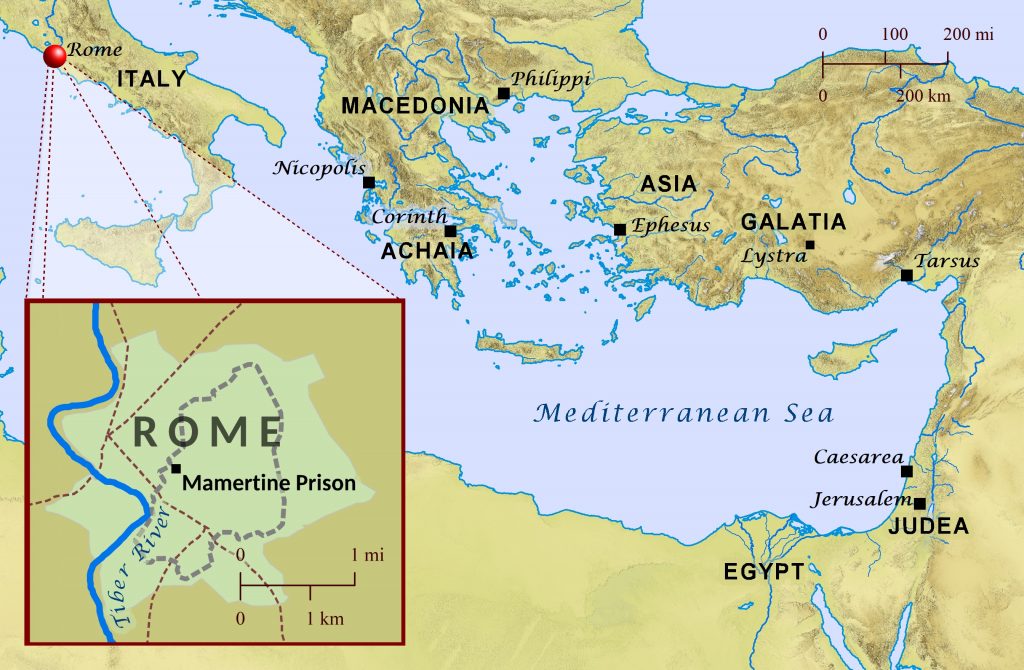Readers’ Version
Literal Version
26:19 Paul tells about his ministry
19 “So then, King Agrippa, I couldn’t disobey that vision 20 so I preached first to those in Damascus and then in Yerushalem and all of Yudea, and then in the towns of the non-Jews. I preached about turning from their sins and turning back to God, and then actually living like people who had repented. 21 It was because of these things that the Jews grabbed me in the temple and tried to do me in. 22 So it is that with God’s help until this very day I have stood testifying to commoners and leaders, teaching nothing other than what Mosheh and the prophets had already written that would happen—23 that the messiah would come and suffer and as the first of the dead to come back to life, he is going to be proclaiming light to both Jews and non-Jews.”
24 Then speaking about Paul’s defence, Governor Festus said, “Paul, you’re stark, raving mad! All your education has turned you into an idiot.”
25 But Paul said, “I haven’t gone mad, most excellent Festus, but I’m speaking the truth in all seriousness. 26 The king knows what I’m talking about and that’s why I’m speaking boldly, because none of these things were done in a corner and I’m sure that none of it has escaped his notice. 27 King Agrippa, do you believe what the prophets wrote? Yes, I’m sure you do.”
28 But Agrippa answered Paul, “Do you think you can talk me into becoming a follower of the messiah in just that short time?”
29 “I hope to God”, said Paul, “whether it takes a short time or a long time, that both you and the others listening today will become just like me except for these chains.”
30 Then the king and the governor both stood, along with Bernice and the others sitting with them 31 and as they left they were saying to each other, “That man hasn’t done anything deserving of death or imprisonment.”
32 “Yes, he could have been set free,” replied Agrippa, “if he hadn’t appealed to Caesar.”
21 On_account these things, the_Youdaiōns having_captured me in the temple, were_attempting to_hand_over me.
22 Therefore having_obtained of_help which from the god until the this day, I_have_stood testifying to_small both and to_great, nothing besides saying of_what things both the prophets and Mōsaʸs/(Mosheh) spoke going to_be_becoming, 23 the chosen_one/messiah if suffering, if first by resurrection from_the_dead, is_going to_be_proclaiming light the both to_the_people and the pagans.
24 And of_him defending these things, the Faʸstos with_loud the voice is_saying:
You_are_raving_mad, Paulos.
The great learning is_turning you to madness.
25 But the Paulos:
Is_saying I_am_ not _raving_mad:
most_excellent Faʸstos, but I_am_speaking_out messages of_truth and sobriety.
26 For/Because the king is_understanding concerning these things, to whom I_am_ also _speaking speaking_boldly, because/for I_am_being_persuaded nothing to_be_escaping_notice him anything of_these things not, because/for this is not having_been_done in a_corner.
27 king Agrippas are_you_believing, in_the prophets?
I_have_known that you_are_believing.
28 And the Agrippas said to the Paulos:
Are_you_persuading me in a_little time to_make a_follower_of_the_messiah?
29 And the Paulos said:
I_might_hope wishfully to_ the _god, both in a_little time and in a_great time, not only you, but also all the ones hearing from_me today, to_become such what_kind also_I am, except of_ the these _bonds.
30 both the king and the governor Stood_up, the both Bernikaʸ and the ones sitting_with with_them, 31 and having_withdrawn they_were_speaking to one_another saying, that This the man any not_one worthy thing of_death or of_bonds is_doing.
32 And Agrippas was_saying to_ the _Faʸstos:
This the man was_able to_have_sent_away, except not/lest he_had_appealed Kaisar.

